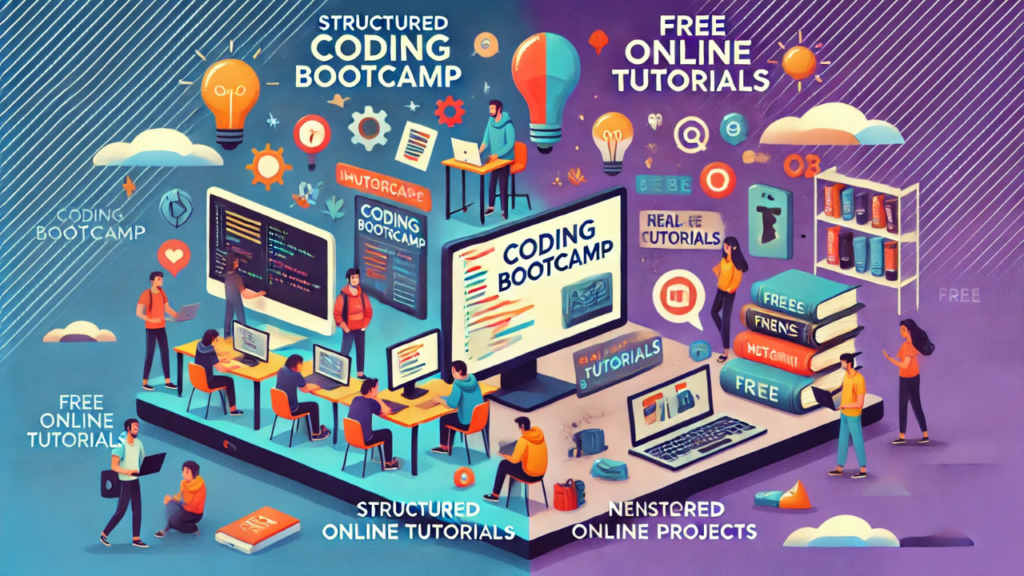Introduction
Have you ever seen a post claiming you can learn to code for free? It’s true—you can. But only a small percentage of people succeed this way. Learning from free tutorials requires discipline, guidance, and structured learning.
Most people struggle without direction. They get lost in fragmented content, feel overwhelmed, or lose motivation. That’s where coding bootcamps come in.A well-structured coding bootcamp increases your chances of success. You learn faster, stay accountable, and gain real-world experience. This blog explores why coding bootcamps offer a superior learning experience compared to free online tutorials.
The Reality of Learning to Code for Free
Free coding resources are widely available. Platforms like YouTube, blogs, and open-source courses provide valuable content. However, many aspiring developers struggle when learning alone. Here’s why:
- Lack of Structure: Tutorials often cover scattered topics without a clear roadmap.
- No Guidance: Without mentors, it’s hard to get answers to your questions.
- Low Accountability: Learning alone requires immense self-discipline.
- Limited Practical Experience: Free resources focus on theory but lack hands-on projects.
- No Job Support: Tutorials don’t provide networking or job placement assistance.
Many beginners start with enthusiasm but soon face challenges. Without proper direction, they lose confidence and give up. While free tutorials can teach the basics, they rarely prepare you for a real developer job. Most people need structured learning, mentorship, and practical projects to succeed.
Why Coding Bootcamps Offer a Better Learning Experience
1. Structured Learning Path
A bootcamp provides a step-by-step learning process. You follow a well-defined syllabus covering essential programming skills. The structured approach ensures you learn efficiently without wasting time searching for the right resources.
A structured curriculum also prevents information overload. Many self-learners jump between topics without mastering the fundamentals. Bootcamps keep you focused, helping you build skills progressively.
2. Expert Mentorship and Guidance
Bootcamps connect you with experienced instructors. These mentors guide you, answer your questions, and help you overcome obstacles. Learning from industry professionals accelerates your growth and prevents common mistakes.
When learning alone, it’s easy to develop bad coding habits. Without expert feedback, you might write inefficient or insecure code. Bootcamp mentors ensure you follow best practices, preparing you for real-world development.
3. Hands-on Projects and Real-World Applications
Unlike tutorials, bootcamps focus on practical learning. You work on real-world projects that mimic industry challenges. By the time you complete the program, you’ll have a portfolio showcasing your skills.
Projects help you apply what you’ve learned. Many bootcamps simulate workplace scenarios, making it easier to transition into a job. Building real applications boosts your confidence and proves your skills to employers.
4. Accountability and Motivation
Self-learning requires discipline. Most people lose motivation when they hit roadblocks. In a bootcamp, you have deadlines, assignments, and a support system that keeps you on track.
Having a set schedule prevents procrastination. Learning alone can be slow because there’s no urgency. Bootcamps push you to stay committed and complete your learning journey.
5. Networking and Career Support
Bootcamps introduce you to industry professionals, fellow students, and alumni. Networking opportunities can lead to mentorship, job referrals, and collaborations. Some bootcamps even have hiring partners, increasing your chances of landing a job.
Connections in the tech industry can be invaluable. Many job opportunities come through referrals. Joining a bootcamp expands your network, giving you access to people who can help advance your career.
6. Faster and More Efficient Learning
Bootcamps are designed to get you job-ready within months. You focus on the most relevant skills, avoiding distractions from unnecessary topics. Intensive learning ensures faster results compared to self-paced tutorials.
Many free learners spend years jumping between different resources. They often revisit the same topics because they lack a clear roadmap. Bootcamps cut through the confusion and accelerate your learning process.
7. Personalized Feedback and Code Reviews
Learning alone means no one reviews your code. Bootcamps provide personalized feedback, helping you improve your coding style and problem-solving approach. This feedback is crucial for mastering programming concepts.
When learning solo, debugging errors can be frustrating. Having an instructor review your code saves time and helps you understand your mistakes. This support speeds up your progress and strengthens your skills.
8. Exposure to Best Practices and Industry Standards
Bootcamps teach coding best practices, clean code principles, and industry standards. You learn how professionals write and structure code, making it easier to transition into a real developer job.
Industry standards change frequently. Bootcamps keep their curriculum updated, ensuring you learn the latest technologies and methodologies. Staying current increases your value in the job market.
9. Soft Skills Development
Technical skills are important, but so are soft skills. Bootcamps train you in teamwork, communication, and problem-solving. These skills make you a better candidate for job opportunities.
Employers look for developers who can collaborate effectively. A bootcamp teaches you how to work in a team, present your ideas, and handle feedback. These skills set you apart from self-taught developers.
10. Higher Job Placement Opportunities
Many bootcamps provide career services, resume building, and mock interviews. Some have partnerships with tech companies, increasing your chances of getting hired. Unlike free tutorials, bootcamps prepare you for the job market.
Getting a job isn’t just about coding skills. You need a strong resume, interview skills, and industry connections. Bootcamps provide the complete package, giving you the best shot at launching your career.
Why Choose StartupHakk’s Fullstack .NET Coding Bootcamp?
StartupHakk offers a licensed and structured coding bootcamp designed for success. Here’s why it stands out:

- Led by Industry Expert Spencer: With 25+ years of experience and executive leadership as a Fractional CTO.
- Comprehensive Fullstack .NET Program: Covers frontend, backend, databases, and deployment.
- Hands-on Projects & Real-World Applications: Learn by building projects that showcase your skills.
- Career-Focused Training: Get job-ready with resume support, mock interviews, and networking opportunities.
- Supportive Learning Environment: Access mentorship, peer learning, and instructor guidance.
If you’re serious about becoming a developer, investing in structured learning is the smartest choice. Bootcamps like StartupHakk provide the tools, support, and guidance needed to launch a successful tech career. Don’t leave your future to chance—choose the path that maximizes your success.
Conclusion
Free tutorials work for a small percentage of learners, but most struggle without structure. Coding bootcamps provide the mentorship, accountability, and hands-on experience needed to succeed.
A structured program significantly increases your chances of landing a developer job. If you want real results, investing in a coding bootcamp like StartupHakk is the best decision for your career.
Don’t waste time on trial and error. Take the fast track to success with the right training and support!




